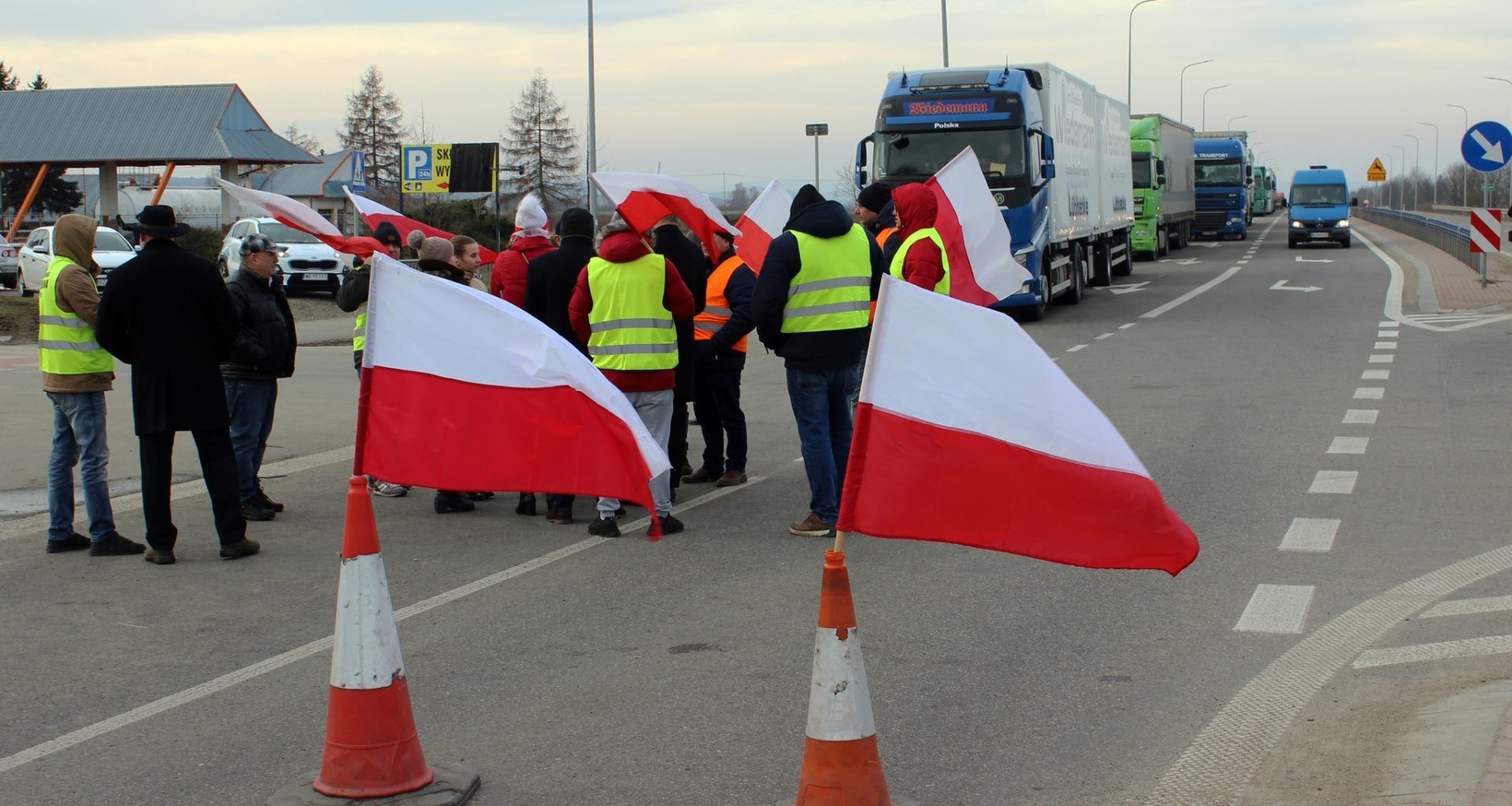The grain crisis, then truckers’ blockades, and now farmers’ protests break the spirit of solidarity between Poland and Ukraine.
Having started on 6 November 2023, the border blockades of Ukrainian lorries by Polish farmers have recently escalated into a full-stop blockade, with several incidents of Ukrainian grain dumping in recent weeks.
While the Polish government finally started taking steps to finish the border blockades, Kyiv and Warsaw should solve the problems behind them. Otherwise, they might explode again.
"To ensure a 100% guarantee that military aid, humanitarian aid, and medical aid reach the Ukrainian side without any delays, we will include border crossings with Ukraine and designated sections of roads and railways on the list of critical infrastructure," said the Polish Prime Minister Donald Tusk.
The local authorities will no longer be able to approve protests. On the contrary, blockades will not be possible anymore, and if needed, there will be a legal basis to remove them by force.
The Polish farmers have already responded that they will not end their protests.
On 27 February, they plan a massive rally and a full blockade of Warsaw. Some protesters declared to continue border blockades even if it is illegal or to move them to other borders. The National Council of Agricultural Chambers calls on the farmers to change the strategy and form of protests.
77% of Polish society supports the farmers' demands, but the form of the protests is highly questionable.
https://twitter.com/EuromaidanPress/status/1761784621904073150
"Road blockades or grain spills are common forms of protest in Poland," explains Łukasz Adamski, deputy director of the Mieroszewski Center for Dialogue, which monitors Polish-Ukrainian relations.
"It should not be forgotten that Ukraine is at war, and if, due to border blockades, humanitarian aid, weapons, or ammunition are not delivered in time, Poland may be considered as partly responsible for the consequences."
All protesting groups have a similar problem – the difficulty of competing with much cheaper products and services from Ukraine, resulting in the collapse of their businesses.
"The problems they are facing are real, but blocking the border is unacceptable," says Dariusz Szymczycha, First Vice-President of the Polish-Ukrainian Chamber of Commerce.
"I am surprised that this decision was not taken earlier, it is a good way to unblock the border, but it does not solve the problems that led to the protests," he comments on the long-awaited decision by Tusk.
Why do the hauliers protest?
The hauliers blocking the border from November to January demand to end privileges (except for military and humanitarian transports) that Ukrainian transport companies received temporarily in June 2022 under the agreement between Ukraine and the European Commission.
Ukrainian transport companies are exempted from obtaining permits for the commercial transportation of goods to and from the EU. At the same time, they don't need to meet EU requirements for drivers' wages or working hours, and on top of that, they pay lower taxes.
"They can be cheaper and take over our clients," argues Mikołaj Kruczek, owner of a transport company from Krosno.
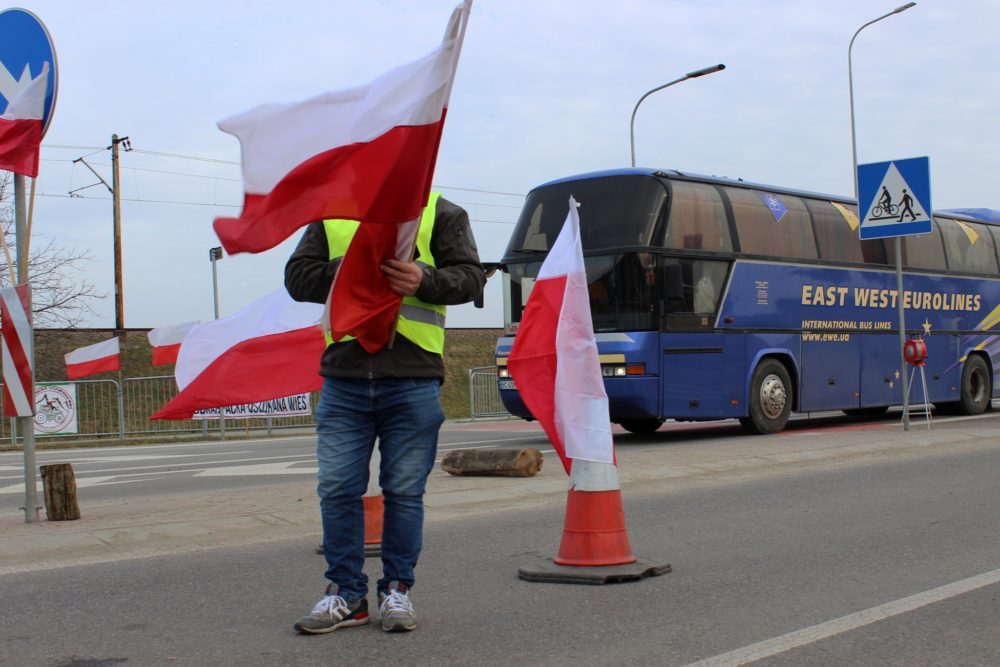
In addition, some Ukrainian companies take advantage of the possibility of entering the EU to haul goods between EU countries or within Poland – what the EU's agreement with Ukraine does not allow.
The Polish hauliers also demanded the improvement of queues in which EU trucks returning to Poland without cargo wait on the Ukrainian side together with trucks undergoing customs procedures.
The traffic became longer after Ukraine introduced an electronic queuing system (eCherha). "Returning to Poland takes even 2 weeks," says Kruczek.
In January, after the Polish government promised to fulfill the demands and Ukraine agreed to open one of the crossings for empty trucks to bypass the queue, the protesters suspended the blockade until 1 March. They complain that the agreement is not fully respected by Ukraine.
"Drivers and companies inform us about cases when empty trucks are still stuck for a long time or even fined in Ukraine. The majority of protesters are hauliers that lost their markets in Ukraine and Russia due to the war,"
says Dariusz Szymczycha.
Why do the farmers protest?
Polish farmers protest the rules of the EU's "Green Deal" and, on the other hand, demand to limit the influx of cheaper agriculture products from Ukraine, which started in June 2022 because of the EU's unprecedented decision to temporarily lift customs duties for Ukraine.
They are concerned about the high cost of adapting to the rules that aim to make the EU climate-neutral by 2050, e.g., the need to change the type of crops annually, reducing pesticides in production, and annual non-use of part of the land.
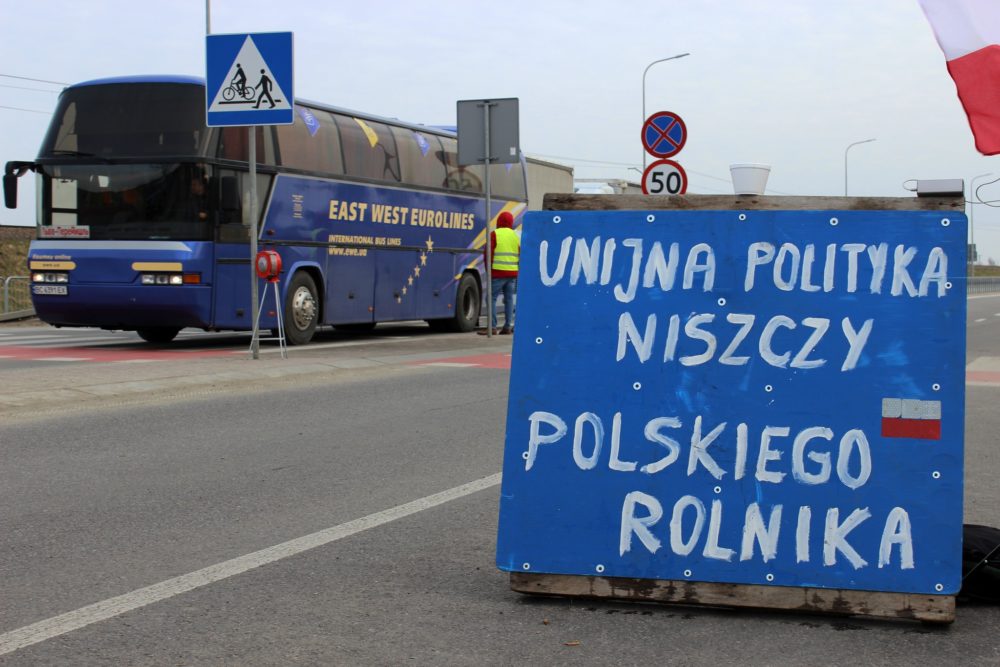
"Our costs will increase dramatically," argues Mateusz Lech, a farmer from Lower Silesia who came to the protest in Medyka. "At the same time, cheap food from Ukraine, which does not have to meet all these requirements, enters our market."
The situation of Polish farmers is also worsened by the drop in prices of agricultural products on world markets.
"In this situation, the opening of the EU market to products from Ukraine, in the solidarity spirit, made Poland as a border country lose the most from this and have the biggest problems because agriculture is also an important branch of the Polish economy," says Łukasz Adamski.
Farmers also point out that the average size of a farm in Poland is a few dozen hectares, while in Ukraine, it is a few hundred.
"We are being destroyed by Ukrainian oligarchs and agroholdings, they have farms of several thousands of hectares, and the war is for them just an excuse to enter our market," emotionally claims Roman Kondrów, leader of the organization Podkarpacka Deceived Village, which leads the protest in Medyka.
Border overwhelmed not only by protests
On the Polish-Ukrainian border crossings expected waiting time for trucks to enter Ukraine is still very long – it ranges from 3 to 6 days. After the blockades were suspended by Polish hauliers, only for a month traffic was not hindered by protests.
"Even without protest, waiting here often takes 1-2 days," says Andrzej, a lorry driver from Debica, whom I met in the queue at Medyka. "At the moment, the situation is dramatic; I've been waiting here for eight days."
The 535-kilometer-long Polish-Ukrainian border has only eight road crossings and three rail crossings, most of which are a heritage from Soviet times. By comparison, in 2007, before Poland joined the Schengen zone, the Polish-German border could be crossed at 48 locations.
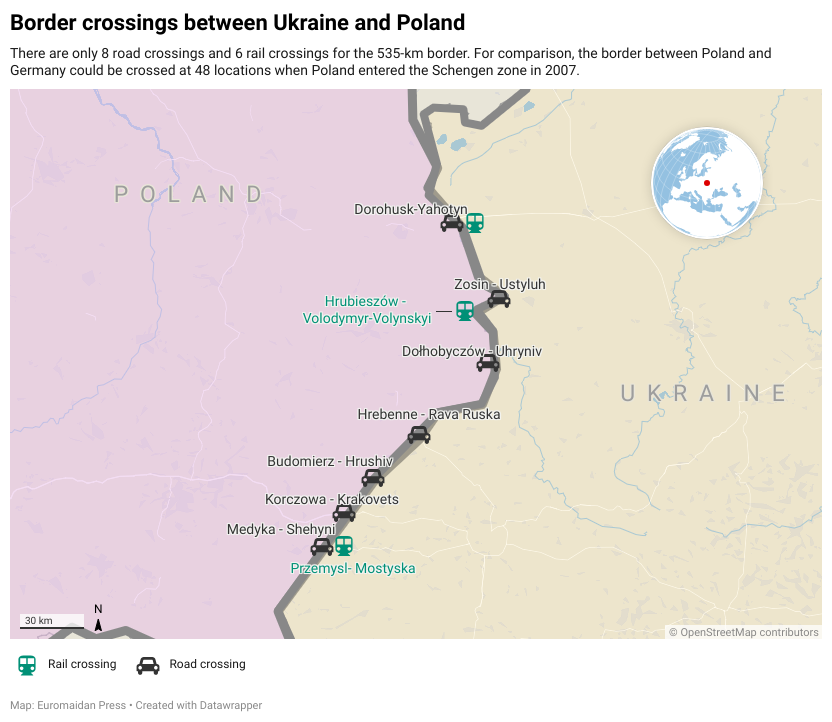
According to the Polish Border Guard, before the full-scale Russian invasion, around 160,000 Ukrainian trucks annually crossed the border with Poland, and in 2023 their number rose to one million. Since 2014, also passenger traffic has gradually increased.
Despite that, the border infrastructure was not developed, and the personnel of the crossings was not increased.
The new border crossings, promised several times by authorities from both countries, are not being built. The situation does not change much with the opening of the new Malhowice-Niżankowice crossing, which is still under construction.
"There is a need to build new border crossings, but a partial improvement can be achieved through better coordination and motivation for Polish and Ukrainian border officers," stresses Dariusz Szymczycha.
What role does Russia play?
Just a day before the biggest blockade, MPs from the far-right Confederation (Konfederacja) party, known for nationalistic and anti-Ukrainian views, visited the border.
"We warned against the Ukrainianization of Poland, against sacrificing the interests of our farmers, hauliers, and consumers. The Polish government has brought our country into the war as one of the parties in the conflict," said Polish MP Grzegorz Braun at a press conference in Medyka.
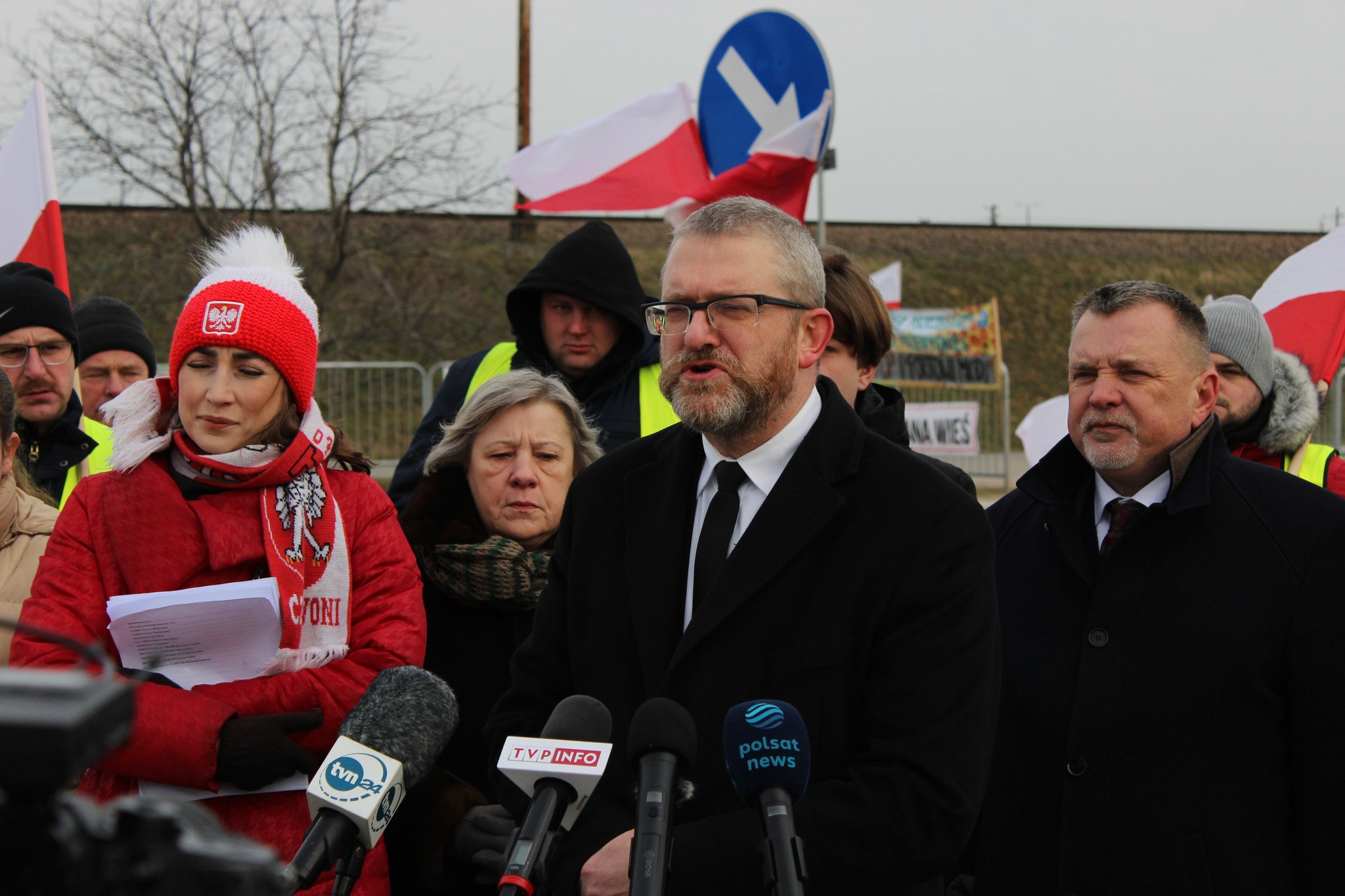
Anti-Ukrainian voices were loud, but most protesting farmers stressed that they are not against Ukraine. One of the leaders of the border crossing blockade in Dorohusk, Hubert Ojdana, criticized a virulent anti-Ukrainian poster on Twitter (X):
"I personally think that such a poster is a shame. We are on strike as farmers for a better life, but not like this. Of course, we need to help Ukraine! I myself helped as much as I could, I hosted 2 families."
In the Silesia region, near the Czech border, one tractor carried a Soviet flag and a banner: “Putin, put things in order with Ukraine, Brussels, and our government.”
The driver was quickly detained by police, and the interior minister Marcin Kierwinski announced that he will be prosecuted for the promotion of a totalitarian system – the punishment is up to three years of imprisonment.
A Polish farmer, who showcased a banner reading "Putin, bring order to Ukraine, Brussels, and our rulers" during farmers' protests against Ukrainian exports to Poland, faces charges of promoting totalitarianism and inciting hatred. https://t.co/eBBp8WjKDB
— Euromaidan Press (@EuromaidanPress) February 21, 2024
The protests were also joined by openly pro-Russian individuals, who in social media repeat Kremlin narratives, deny war crimes, and have contacts with the Russian embassy.
Despite general support for Ukraine, there is still a certain anti-Ukrainian resentment in Poland which the Kremlin tries to exploit.
"It comes from non-resolved issues such as the exhumation and burial of the victims of the Volhynian massacre," claims Łukasz Adamski. "Part of the Polish society, especially where the victims' descendants live, i.e. in eastern Poland, is being easily lured by anti-Ukrainian manipulations. Kyiv's permission for exhumation works would be a very important step."
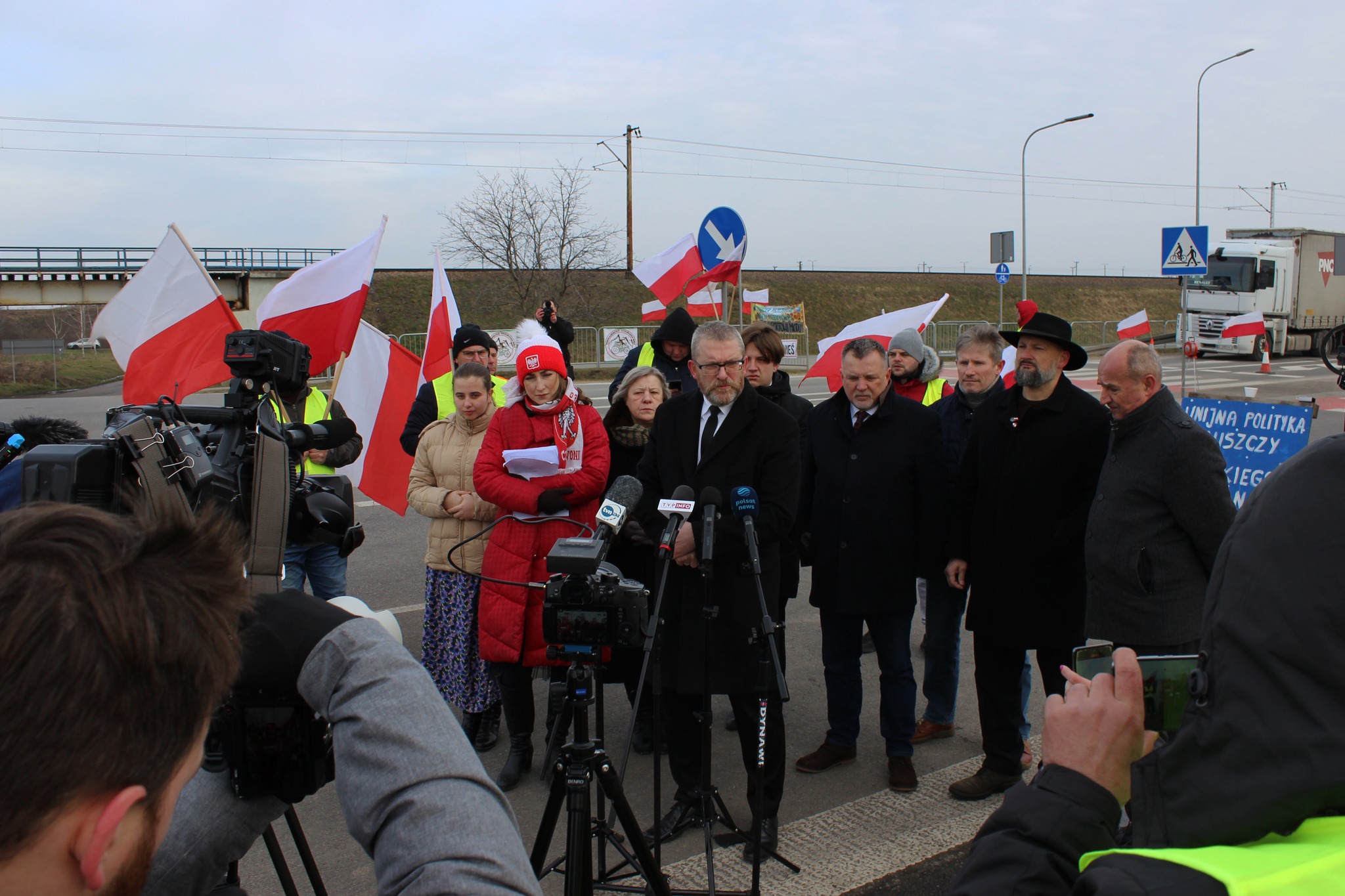
Both sides are losing
According to the Central Statistical Office of Poland, in 2023, exports of Polish goods to Ukraine reached EUR 10 billion. In the same period, Ukrainian exports to Poland reached the amount of EUR 4 billion.
The blockades affect both Polish and Ukrainian companies.
"One of our members recently lost a client, a chain of supermarkets in Ukraine, as due to protest, they could not ensure timely delivery of food products," says Dariusz Szymczycha.
The farmers themselves may soon become victims of their own protests. Last year, Poland exported to Ukraine processed food worth nearly one billion euros.
"If Ukraine decides to block the border from its side, the situation for several Polish dairy cooperatives will be rather grim. To whom would the farmers sell their milk then?" asks Szymczycha.
The farmers state that they do not want a conflict with Ukraine.
"It is simply not fair that it is on us to bear the costs of the situation, the storage silos are full and Ukrainian grain is not only transited further but also sold on the Polish market," argues Mateusz Lech. "I must pay loans, and feed my family, and the current prices of grains won't even allow me to cover my costs."
Agri-food products account for about 60% of the total Ukraine’s exports.
"We should not forget that export gives a huge income to the Ukrainian budget, which not only allows to pay for the defense but also covers social purposes, pensions, etc.," emphasizes Łukasz Adamski.
The end of the honeymoon?
The border blockades targeted cargo transport, although there have been a few incidents where protesters have tried to block buses or even trains. Protesters shouted to passengers, mainly Ukrainians, to go back home. Polish police intervened, and traffic was restored.
"The resentment against Ukrainian refugees is increasing in Poland; they are blamed for various social issues, and on the other hand, there is also a sense of regret that despite the huge wave of solidarity and support, Kyiv is not willing to solve even a very symbolical issue,"
explain Łukasz Adamski.
On the other side of the border, sympathy towards Poland is also decreasing.
According to public opinion surveys conducted by Mieroszewski Center for Dialogue in October 2023, 67% of Ukrainians viewed Poles positively and only 1% negatively, but in January, after the truckers’ blockade, for the same question, only 44,5% responded positively, and 9% negatively.
"The honeymoon period in Polish-Ukrainian relations, which was very visible 2 years ago, is certainly over. We now have smaller or bigger disputes, but eventually, the cooperation will continue. The situation is too serious for us to break up our relations over issues of border blockades," claims Adamski.
Poland is stepping up for Ukrainian refugees, but it cannot take everyone in
More united than divided
The public invitation to meet at the border addressed by President Volodymyr Zelensky to the Polish authorities was received skeptically in Poland.
"In diplomacy, such things are first agreed between partners and only then publicly announced," says Łukasz Adamski.
Romania demonstrated an approach to solving the problem, where a bilateral licensing system was introduced to stop the uncontrol influx of agricultural products from Ukraine. It sets limitations for importers and reduces grain speculation and transfers into the black market. However, negotiations between Poland and Ukraine are stuck in a deadlock.
"These problems can be solved by better cooperation between both governments and with a better attitude of officials on both sides of the border," underlines Dariusz Szymczycha.
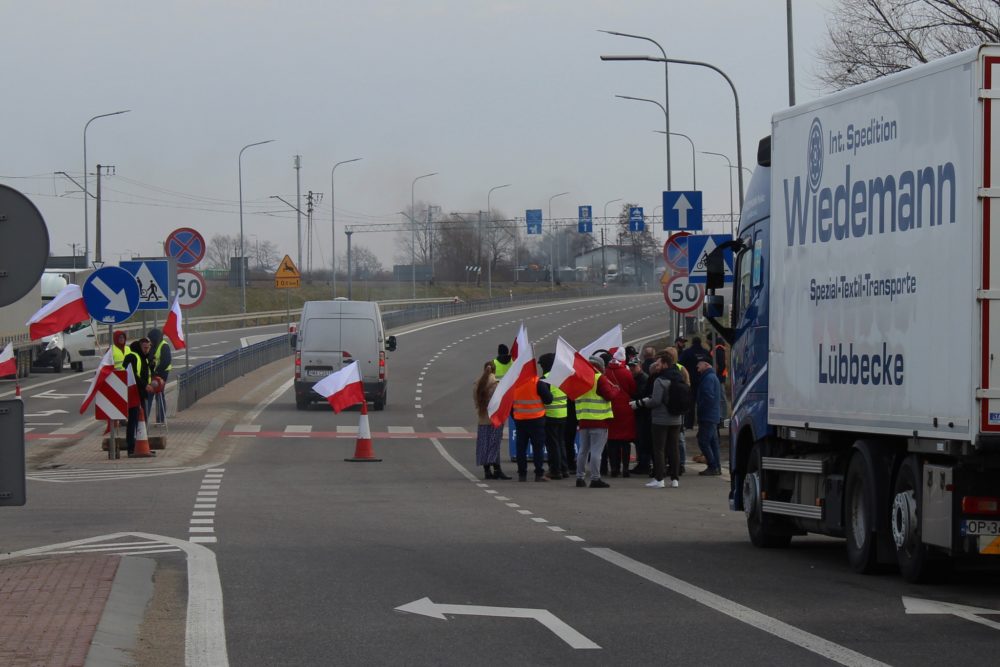
The European Commission also has practical solutions to the problems in its hands: consent for public aid for sectors affected by opening EU markets to Ukraine.
"There could be introduced some forms of limitations, but we cannot close ourselves off to trade with a country that is at war, this would be against EU principles," says Szymczycha.
Experts agree that Polish-Ukrainian relations should not be reduced to these two protests.
"The Russian offensive is ongoing. If it defeats Ukraine, it can go further. The Polish elite understand this, and the Ukrainian elite also understand that they cannot lose a country that is one of their biggest allies and a bridge between Ukraine and Europe. I hope that in the end, not emotions, but rationality will prevail," says Adamski.
"Poles and Ukrainians are more united than divided. What happened is not a rebellion of Poles against Ukraine and Ukrainians, but only a protest of two professional groups that do not represent the entire Poland," emphasises Szymczycha.
Related:
- The Russian trace in the Polish trucker border blockade
- Unprecedented: 160 tons of Ukrainian grain dumped in Poland
- Ukraine plans new Danube export route to bypass Poland border blockade
- Grain dispute: how Poland and Ukraine can reach a solution
- Poland ditches Ukraine border meeting called by Zelenskyy

